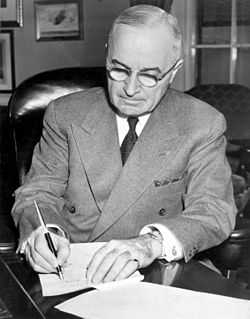Liberal hawk
The term liberal hawk refers to a politically liberal individual (in the American sense of the term) who supports a hawkish, interventionist foreign policy. Past U.S. presidents Franklin D. Roosevelt, Harry S. Truman, John F. Kennedy and Lyndon B. Johnson have been described as liberal hawks for their roles in bringing about America's status as the world's premier military power. The Clinton Doctrine can also be considered as consistent with this vision. Today the term is most frequently used to describe liberals and leftists who supported or still support the decision to invade Iraq in 2003, which was authorized by the United States Congress and ordered by a conservative president, George W. Bush. The war has stirred heated controversy among all political sides of the debate. The American left was divided over the issue of whether going to war in Iraq was the right decision, as some liberals felt that they should support the war, in accordance with the philosophy of liberal internationalism, which had caused them to support military intervention in the past.[1]
One document often cited as promoting a liberal hawkish point of view is Progressive Internationalism: A Democratic National Security Strategy, published by the Progressive Policy Institute in October 2003. Another document related to this philosophy is a letter to President Bush sent by Social Democrats USA in February 2003, urging the military overthrow of Saddam Hussein's regime.[2]
In January 2004, Paul Berman, Thomas Friedman, Christopher Hitchens, George Packer, Kenneth Pollack, Jacob Weisberg, Fareed Zakaria and Fred Kaplan participated in a five-day online forum entitled Liberal Hawks Reconsider the Iraq War, in which they discussed whether they had been correct in advocating military action against Saddam Hussein's regime. Kaplan by that point had renounced his prior support, but the general consensus among the participants was that, despite the absence of weapons of mass destruction in Iraq, the war had still been justified on humanitarian grounds.
In his book The Good Fight, published in 2006, Peter Beinart renounced his prior support for the Iraq War, saying, "I was too quick to give up on containment, too quick to think time was on Saddam's side."
People

People who have been described as liberal hawks include:
- Ronald D. Asmus, scholar at the German Marshall Fund of the United States[3]
- Paul Berman, contributing editor to Dissent and The New Republic (described as a 'Philosopher King' of liberal hawks)[3]
- Larry Diamond, senior fellow at the Hoover Institution[3]
- Michael McFaul, senior fellow at the Hoover Institution[3]
- Kenneth Pollack, former Clinton administration advisor and senior fellow at The Brookings Institution[3]
- Michael Tomasky, Editor of Guardian America[3]
- Michael Ignatieff, former Leader of the Liberal Party of Canada, former Professor at Havard's Carr Center for Human Rights Policy
- Jonathan Chait, self-described liberal hawk[4]
References
- ↑ Packer, George. "The Liberal Quandary Over Iraq." The New York Times Magazine. December 8, 2002.
- ↑ [http://www.socialdemocrats.org/IraqLetter3.html Letter to President Bush sent by Social Democrats USA
- ↑ 3.0 3.1 3.2 3.3 3.4 3.5 Anatol Lieven, Liberal Hawk Down, Anatol Lieven, The Nation, 7 October 2004
- ↑ http://www.tnr.com/blog/jonathan-chait/the-yokes-you-krauthammer
External links
- Progressive Internationalism: A Democratic National Security Strategy
- A Liberal's Case for Bush's War., Michael Totten, FrontPage Magazine, January 8, 2003.
- Slate: Liberal Hawks Reconsider the Iraq War
- Bush’s Useful Idiots, Tony Judt, London Review of Books, 21 September 2006